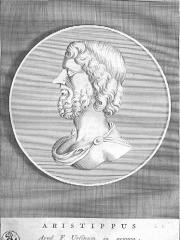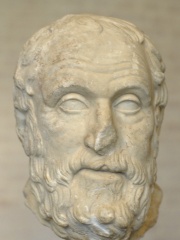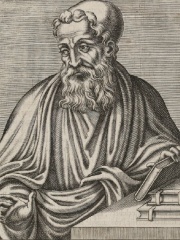







The Most Famous
Philosophers from Libya
This page contains a list of the greatest Libyans Philosophers. The pantheon dataset contains 1,267 Philosophers, 9 of which were born in Libya. This makes Libya the birth place of the 25th most number of Philosophers behind Algeria and Netherlands.
Top 9
The following people are considered by Pantheon to be the most legendary Libyans Philosophers of all time. This list of famous Libyans Philosophers is sorted by HPI (Historical Popularity Index), a metric that aggregates information on a biography's online popularity.

1. Aristippus (434 BC - 355 BC)
With an HPI of 79.14, Aristippus is the most famous Libyans Philosopher. biography has been translated into 55 different languages on wikipedia.

2. Carneades (214 BC - 129 BC)
With an HPI of 72.79, Carneades is the 2nd most famous Libyans Philosopher. biography has been translated into 42 different languages.

3. Synesius (370 - 413)
With an HPI of 70.59, Synesius is the 3rd most famous Libyans Philosopher. biography has been translated into 33 different languages.

4. Hegesias of Cyrene (400 BC - 300 BC)
With an HPI of 67.07, Hegesias of Cyrene is the 4th most famous Libyans Philosopher. biography has been translated into 27 different languages.

5. Theodorus the Atheist (340 BC - 250 BC)
With an HPI of 67.02, Theodorus the Atheist is the 5th most famous Libyans Philosopher. biography has been translated into 27 different languages.

6. Arete of Cyrene (400 BC - 340 BC)
With an HPI of 65.25, Arete of Cyrene is the 6th most famous Libyans Philosopher. biography has been translated into 24 different languages.

7. Lucius Annaeus Cornutus (10 - 80)
With an HPI of 62.08, Lucius Annaeus Cornutus is the 7th most famous Libyans Philosopher. biography has been translated into 21 different languages.

8. Lacydes of Cyrene (300 BC - 205 BC)
With an HPI of 59.28, Lacydes of Cyrene is the 8th most famous Libyans Philosopher. biography has been translated into 17 different languages.

9. Anniceris (400 BC - 360 BC)
With an HPI of 58.89, Anniceris is the 9th most famous Libyans Philosopher. biography has been translated into 18 different languages.
People
Pantheon has 9 people classified as Libyans philosophers born between 434 BC and 370. Of these 9, none of them are still alive today. The most famous deceased Libyans philosophers include Aristippus, Carneades, and Synesius.
Deceased Libyans Philosophers
Go to all RankingsAristippus
434 BC - 355 BC
HPI: 79.14
Carneades
214 BC - 129 BC
HPI: 72.79
Synesius
370 - 413
HPI: 70.59
Hegesias of Cyrene
400 BC - 300 BC
HPI: 67.07
Theodorus the Atheist
340 BC - 250 BC
HPI: 67.02
Arete of Cyrene
400 BC - 340 BC
HPI: 65.25
Lucius Annaeus Cornutus
10 - 80
HPI: 62.08
Lacydes of Cyrene
300 BC - 205 BC
HPI: 59.28
Anniceris
400 BC - 360 BC
HPI: 58.89

